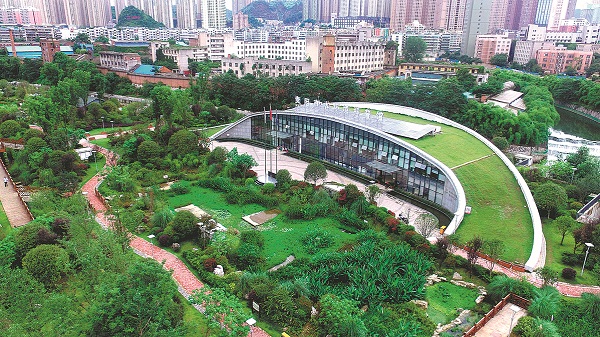Underground solution helps clean up river

An aerial view of the Qingshan plant, the first underground sewage treatment factory in Guiyang, Guizhou province. [Provided to China Daily]
Subterranean sewage plants result in environmental improvements
The park south of the Nanming River in Guiyang, capital of Guizhou province, looks no different from many others on a clear, crisp morning as the birds sing and runners and walkers exercise.
Hou Jinzhi, who takes a walk in the park every morning, carrying his pet bird in a cage, said, "If you don't live locally, you would never know there is an underground sewage treatment plant here."
The 76-year-old was among residents who initially opposed the plant being built due to environmental concerns, but he quickly found that the facility had no impact on the area.
Apart from a low droning sound coming from near two air outlets for the plant, he said no other noise can be heard from the facility. Neither can any foul smells be detected.
Completed in 2015, the Qingshan ("lush mountain") plant is the first underground sewage treatment plant in Guiyang, and it may provide a solution to the increasing amount of sewage in urban areas with shrinking land resources.
Zhou Fubo, head of the plant, said that instead of troubling residents with noise and bad smells, the plant can greatly benefit the neighborhood.
Stretching for about 185 kilometers, the Nanming River used to be so clear that residents took water directly from it for drinking. However, years of industrialization and urbanization in Guiyang left the waterway heavily polluted and killed most of its aquatic life, according to the city's water resources management bureau.
Thanks to the local government's pollution control efforts around the turn of the century, by 2004, the river water had become significantly cleaner, but the situation worsened again as Guiyang's population doubled to 4 million from 2004 to 2012.
Hou was keenly aware of the worsening pollution in the river.
"When I was a child, I often swam in the river. The water was so clear that you could see the bottom," he said.
When the river became heavily polluted due to industrialization in Guiyang, Hou avoided it as much as possible because of the overpowering stench that came from the waterway.
Presented by China Daily.
黔ICP备05001922号-3
